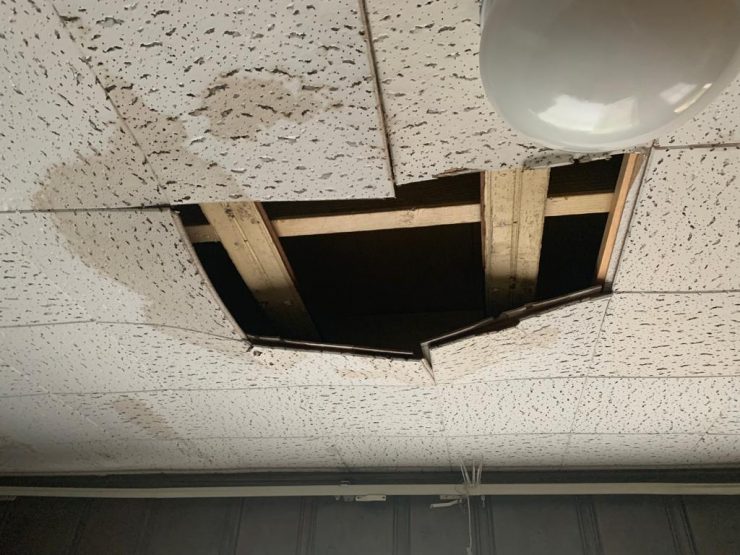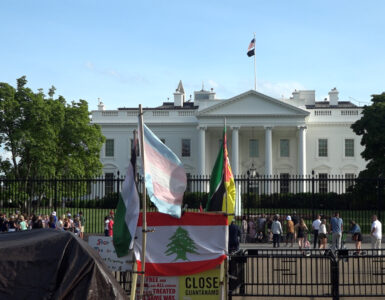Housing activists Saturday hit the streets to advocate for safer living conditions for D.C. tenants.
The Democratic Socialist Association, D.C., staged the canvassing event, using it to assert that many landlords in the District violate the implied warranty of habitability in residential lease agreements.
The implied warranty of habitability ensures the safety and sanitation of housing units from the first day of tenancy, according to the D.C. Tenant Bill of Rights. This includes keeping properties free of pests and ensuring good infrastructure as well as adequate light and ventilation.
There are approximately 40,000 units in the city that meet some criteria for being less than habitable in terms of causing health conditions, according to a 2022 study by D.C Primary Care Association.
David Poms, an organizer with the Democratic Socialist Association, aided in the development of the study. “That’s like 10-12% of units that are inhabitable,” Poms told The Wash.
Olivier Frei, a former Georgetown resident, experienced this problem when he interned with the Swiss Embassy in 2021. Frei said he had a ceiling tile fall down on him during a thunderstorm a few nights after he arrived in D.C.
“I wake up all of a sudden feeling something on my feet on my bed,” Frei told The Wash. “The landlady accused my other roommate for not having closed the windows in her room and she says thamust have let in the water for the ceiling to break.”
The landlady then proceeded to withhold Frei’s roommate’s entire security deposit with no investigation into the cause and the effect of the breakage of the ceiling, Frei said.
“We were more worried and upset about the costs and how they were shared without much evidence provided,” he said.
D.C. laws protect security deposits.
“D.C. has very specific laws when it comes to deducting from security deposits so there’s a specific timeline where the landlord has to do an inspection and inform the tenant whether anything will be deducted from the deposit,” Nicole McEntee, a program analyst of education and outreach with the D.C. Tenants’ Advocate, told The Wash.
The landlord has to provide receipts, photographs and any evidence they can show and, if they don’t comply with the law, the tenant can take help from the Office of the Tenant Advocate, D.C., according to McEntee.
McEntee said that there are a lot of cases in D.C. where the landlord either doesn’t understand the law or neglects the law.
“That’s where the office is here to help tenants when they find themselves in situations like these where they don’t know what to do,” McEntee said.
The living conditions clause is meant to keep tenants in habitable properties, according to the Legal Information Institute. Poms said that he feels strongly about people not knowing how to push their rights in a tenant situation.
“There is a power imbalance, even in D.C., where we have a lot of tenant rights, landlord-tenant courts and laws that imply the warranty of habitability,” he said.
“That was my 3rd day in the country and I didn’t even know that legal help for tenants even existed,” said Frei. The same incident happened a few months later.
“We probably should’ve handled the situation better,” Frei said.
Poms pointed towards the Stomp out Slumlords, a signature tenants rights campaign in 2018 organized by the DSA. Stomp out Slumlords has been instrumental in organizing numerous rent strikes all over the city, Poms said.
“It started with finding people who were listed in the landlord-tenant court for eviction and knocking on their door asking if they knew that they had options to get out of this situation,” Poms said.
Organizations pooling efforts to organize tenants.
Several local organizations like the Stomp out Slumlords, D.C. Tenants’ Rights Center and Georgetown University’s Kalmanovitz Initiative for Labor and the Working Poor have pooled efforts to organize rent strikes in neighborhoods like Georgetown, Columbia Heights and Brightwood Park.
The D.C. Healthy Housing Collaborative wrote an advocacy letter to the Council of the District of Columbia earlier last year addressing the “substandard housing conditions that contribute to significant health issues affecting District of Columbia residents.” The Wash obtained a copy of the letter.
The letter highlighted the significant presence of rodents in residential complexes. “However, coordination between this program and other abatement and inspection programs is important in order to ensure that abatement is effective,” the letter states.
The next social housing and advocacy for livable conditions canvassing by the D.S.A is scheduled for Sept. 21. As per the Metro DC DSA website, this organization effort is to “facilitate collective action in support of the passage and implementation of the Green New Deal for Housing Amendment Act.”
The staff at Brooke Pinto’s office and members of ANC 2E declined to comment on this story.















Add comment